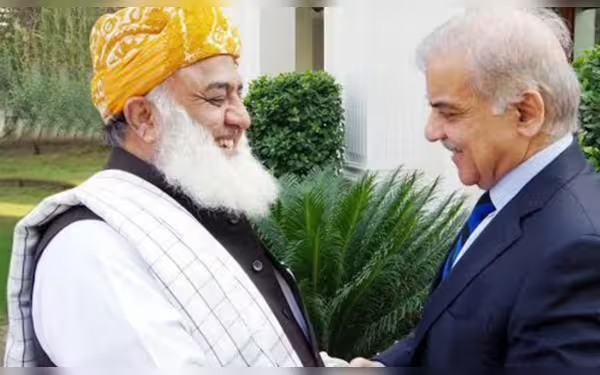Saturday, November 16, 2024 03:22 PM
Fazlur Rehman Rejects Judges’ Tenure Extension in Pakistan
- Fazlur Rehman opposes judges' tenure extension.
- Government faces challenges in judicial reforms.
- Lack of consensus hampers constitutional amendment efforts.
 Image Credits: jasarat
Image Credits: jasaratFazlur Rehman opposes judges' tenure extension, complicating Pakistan's judicial reform efforts amid political challenges.
In recent developments within Pakistan's political landscape, the Jamiat Ulema-e-Islam-Fazl (JUI-F) chief, Maulana Fazlur Rehman, has taken a firm stance against the government's proposal to extend the tenure of judges and to raise their retirement age. This decision has significant implications for the ruling coalition, which is currently facing challenges in garnering sufficient support for a proposed constitutional amendment package aimed at overhauling the country's judicial and parliamentary systems.
The proposal for extending judges' tenures and increasing their retirement age was part of a broader constitutional amendment package that the government hoped would streamline judicial processes and enhance the efficiency of the legal system. However, the lack of consensus among political parties has left this initiative in a precarious position. While some opposition parties, including the Pakistan Tehreek-e-Insaf (PTI), have shown conditional support for the establishment of a constitutional court, they remain divided on the contentious issue of judges' extensions.
During a recent meeting of a special parliamentary committee convened to discuss the amendment package, no agreement was reached, despite multiple rounds of discussions. This failure to achieve consensus has created a significant roadblock for the government, which is eager to push these amendments through parliament. The National Assembly session, originally scheduled for 11 AM on Sunday, was delayed and eventually commenced late at night, reflecting the ongoing negotiations between the government and opposition parties.
Maulana Fazlur Rehman’s opposition to the judges’ extension is particularly noteworthy, as it underscores the complexities of Pakistan's political dynamics. His refusal to support the proposal not only complicates the government's efforts but also highlights the broader concerns regarding judicial independence and accountability. Many believe that extending judges' tenures could lead to a lack of accountability within the judiciary, which is a critical pillar of democracy.
As the situation unfolds, it remains to be seen how the government will navigate these challenges. The ongoing discussions and negotiations will be crucial in determining the future of the proposed amendments. For citizens, this political tug-of-war raises important questions about the integrity of the judicial system and the role of political parties in shaping its future. Ultimately, the outcome of these discussions will have lasting implications for Pakistan's governance and the rule of law.













